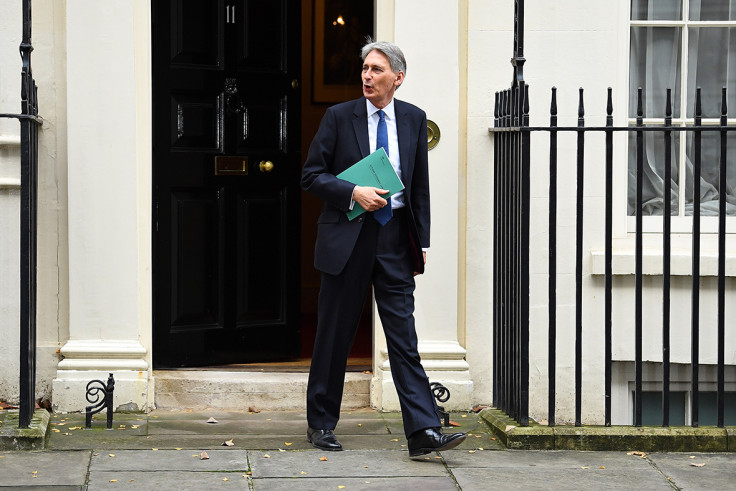Philip Hammond's boring but effective Chancellorship is what Britain needs right now
The new Chancellor's delivery might be dull, but his composure and pragmatism is needed.
In his first Autumn Statement as Chancellor of the British Exchequer, Philip Hammond delivered few meaningful surprises, cracked the odd joke, took a swipe or two at the opposition, commended the resilience of the UK economy after the 23 June Brexit vote, and warned of economic uncertainty, before commending a dour speech to the House of Commons.
Brexiters said he was too gloomy, think-tanks said his fiscal forecasts were too optimistic, friends called it an accomplished performance, foes dubbed it a disaster, while a body language expert said Hammond could make a lottery win sound like bad news.
The IBTimes UK politics desk noted the Chancellor had abandoned the pomp of his photo-friendly predecessor George Osborne and set a no-frills tone in a relatively short 54-minute-long speech.
For what was dubbed as the most important financial statement by the British government since the Brexit vote, Hammond's take was decidedly underwhelming. Yet in uncertain climes, the new chancellor exuded calmness, composure and pragmatism; something which the country desperately needs right now.
Ahead of announcing lower growth projections for 2017 in sync with the Office for Budget Responsibility (OBR), the Chancellor hastened to point out that the UK economy was growing at a rate faster than that of Italy and France, at par with Germany, and had made the International Monetary Fund eat a humble pie.
Both during his speech, and in a post-speech defence of the performance, Hammond stressed one word that that neither main street nor the City should lose sight of – "uncertainty." Brexit negotiations have not begun yet, and nobody knows how the market wil react, whether positively or negatively, and how that will compare to other global events including the Italian and French elections, a Trump presidency and China's perceived economic slowdown.
So I am afraid I do not buy the Brexiters argument that Hammond was too gloomy. To quote the influential EY ITEM Club's chief economic adviser Peter Spencer: "The strength of the economy following the EU Referendum vote allowed both the OBR and the Chancellor to approach the Autumn Statement cautiously. Neither has wanted to be seen as overreacting to the uncertainty surrounding the position of the UK following the vote."
But enough about economic forecasts, let's talk policy measure or rather their absence in the Autumn Statement. Hammond delivered little, no doubt worried about the kind of fiscal manoeuvring that might be possible over the next financial year.
Even the target for a fiscal surplus has been postponed from the end of this Parliament to the end of the next, consigning Osborne's target of achieving it by 2020 to the political dustbin. Hammond said the government will publish a draft charter for budget responsibility with three fiscal rules.
"First, the public finances should be returned to balance as early as possible in the next parliament, and in the interim cyclically adjusted borrowing should be below 2% by the end of this parliament. Second, public sector net debt as a share of GDP must be falling by the end of this parliament, and third, that welfare spending must be within a cap set by the government and monitored by the OBR."

He added that the government will work to confront Brexit challenges head on and help the country become more productive. To this effect, the Chancellor announced a "National Productivity Investment Fund" of £23bn, to be spent on innovation and infrastructure over the next five years.
In line with market expectation, the rise in fuel duty was cancelled for the successive seventh year – at a cost of £850m, saving car drivers £130 and van drivers £350 a year, on average. Moving on to personal allowances, Hammond said the tax threshold would rise to £11,500 in April from the current figure of £11,000.
He added the government is still committed to taking the allowance up to £12,500 by the end of this parliament, and that the 40p threshold will rise to £50,000 over the same period.
Hammond also pledged more than £1bn for broadband and 5G. "My ambition is for the UK to be a world leader in 5G. That means a full fibre network; a step-change in speed, security and reliability," he said.
The Chancellor also confirmed funding for 40,000 new homes and announced a large-scale pilot to give the right to buy to housing association tenants.
"We will focus government infrastructure investment to unlock land for housing with a new £2.3bn Housing Infrastructure Fund to deliver infrastructure for up to 100,000 new homes in areas of high demand. And, to provide affordable housing that supports a wide range of need, we will invest a further £1.4bn to deliver 40,000 additional affordable homes."
And even before he got up at the dispatch box, it was widely reported that Hammond would ban letting agent fees for tenants in England and Wales.
Finally, while many commentators thought this would be the last Autumn Statement, few imagined Hammond would replace it in the future by an Autumn Budget, with the 2018 and subsequent Spring Budgets relegated to simple statements.
However, with the road ahead appearing uncertain, it remains to be seen whether Hammond will be able to stick to his ambition of avoiding fiscal changes in the spring as he explicitly stated in Parliament. If he can't, expect changes introduced demurely in an underwhelming fashion.
Gaurav Sharma is the Business Editor of IBTimes UK. He has been a financial journalist for over 15 years, with a core specialisation in macroeconomics and commodities. Follow Gaurav on Twitter.
© Copyright IBTimes 2025. All rights reserved.






















